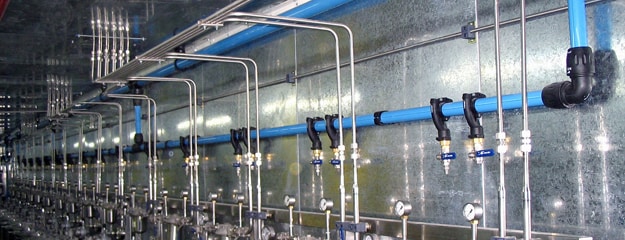Common Problems Solved By Modular Aluminum Compressed Air Piping Systems

Compressed air — often referred to as the fourth utility in manufacturing facilities — is undoubtedly one of the work horses of the food and beverage manufacturing industry.
Packaging facilities should be able to rely on a clean, efficient supply of compressed air to automate a process, provide motive power or generate other gases. When this is the case, facilities can be confident their compressed air solutions will deliver cost-effective production consistently and without creating secondary issues.
However in far too many cases, the low quality or efficiency of a facility’s compressed air pipeline system ends up costing the business untold dollars in wasted energy, air leaks, lengthy and difficult air line modifications, damaged equipment, or compromised products.
Old, poorly filtered compressed air systems constructed of steel or black iron are susceptible to corrosion, which causes problems for downstream pneumatic equipment and can also increase the risk of product contamination.
Another downside of iron, steel, and stainless steel piping systems are their bulky weight and time-consuming installation, combined with the fact that they generally cannot be moved without significant time and labor requirements. Older air lines also tend to be susceptible to leaks, leading to pressure drop and wasted energy costs.
In fact, compressed air leakage in manufacturing facilities is a significant source of loss: According to an article in Plant Engineering, compressed air systems in the U.S. account for $3.2 billion in wasted energy costs annually due to preventable maintenance issues and inefficient operations.
To address these problems, facility managers and their OEMs should consider the benefits of modular, lightweight air line systems. In many cases, these may be able to reduce energy costs, increase system flexibility, and simplify installations, while providing a fast ROI.
A case in point is The Coca-Cola Company, which has specified Parker’s Transair modular aluminum air line system for bottling plants around the world. The company began using the system 12 years ago and found it allowed the company to add compressed air to new packaging machines without tools within minutes, as opposed to hours.
In another case, a global baking company was able to earn a return on its investment in the modular system within two months, because it saved the company about as much in wasted utility costs from compressed air leakage, as the cost of the system itself over that time period.
Modular, quick-connect air line systems such as Transair are constructed of lightweight aluminum that is up to 75% lighter than traditional steel systems. The pipe is easy to handle and safe to work with on elevated platforms, and quick connections eliminate the need to thread or soldier pipe. Transair is also guaranteed to be leak-free and can accommodate vacuums and other inert gases used in food packaging applications, such as nitrogen, as well as compressed air.
In Transair’s case, components are removeable and interchangeable, enabling manufacturing plant personnel to implement changes within minutes. OEMs and their customers also can build and connect machines for testing, then break them down and ship them to other facilities as needed for quick setup and installation.
Solutions like this make reconfiguration and process changes practical and efficient compared to traditional copper and steel piping solutions. And because aluminum systems weigh so much less than traditional steel systems, roof loads are reduced drastically as well.
Modular systems can be cleaner than traditional pipe systems too. The Transair system does not corrode and it offers a clean, professional look. Manufactured with a protective polyester coating resistant to chemical washdowns typical of the food and beverage industry, the Transair system is offered in a variety of colors and resists dust, chemicals, and scratches. Its rust-proof and clean appearance also lends significant aesthetic appeal in production and packaging areas.
One additional benefit some facilities have realized is the fact that the Transair pipe system meets the ISO 8573 certification for the compressed air quality. This means that properly prepared compressed air from the system can be used to index and package foods, and the air line system will not introduce new contaminants since it does not corrode.
While modular systems offer the most benefits when specified as complete systems, transition fittings allow OEMs or manufacturers to install partial or hybrid systems if needed. For example, Transair can be easily integrated in existing copper and steel piping, making it ideal for upgrades or expansions.
Considering their faster installation capabilities, modular systems are also ideal for facilities that need longer air line runs measured in miles or kilometers rather than feet and meters. For example, Transair can be installed as quickly as 45 feet per hour, which is several times faster than typical installation speeds for galvanized and copper pipe systems.
Because modular, lightweight air line systems are clean, flexible, movable, and relocatable, food companies can move and reinstall their machines as needed. As food and beverage packaging facilities continue to look for ways to increase operational flexibility, modular compressed air solutions offering fast and easy installation is one tool that will help them accomplish this.



